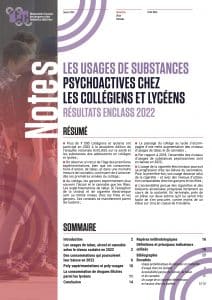The EnCLASS survey, a joint initiative by the Health Behaviour in School-aged Children (HBSC) study in France and the European School Survey Project on Alcohol and Other Drugs (ESPAD), offers a comprehensive analysis of substance use among French adolescents. Conducted between March and June of 2022, the survey included over 9,500 students from middle and high schools, providing valuable insights into the evolving patterns of alcohol, tobacco, and cannabis use.
Key findings include:
- Delayed initiation of substance use: A notable shift is seen in the age of initial substance experimentation. Adolescents are starting to use substances like alcohol, tobacco, and cannabis at a later age compared to previous years.
Increased perceived accessibility: Despite the delay in initiation, by the end of high school, about half of the students believe it is very easy to obtain alcohol and cigarettes, raising concerns about accessibility. - Alcohol consumption: Alcohol remains the most tried substance among adolescents. While there’s a slight decline in experimentation rates, the prevalence is still significant.
- Rise in e-cigarette use: A striking trend is the increase in electronic cigarette use, which has now surpassed traditional cigarette smoking among students. This trend is equally prevalent among both boys and girls.
- Binge drinking: The survey also uncovers high levels of binge drinking, defined as consuming five or more drinks on a single occasion, especially in high school students.
- Gender differences in substance use: Boys are more likely to experiment with alcohol and cannabis in middle school, while tobacco use (excluding hookah) and electronic cigarette usage show no significant gender differences.
- Decrease in tobacco and cannabis use: There is a noticeable decrease in the use of tobacco and cannabis among adolescents, signaling the effectiveness of prevention measures in these areas.
The collaboration between HBSC and ESPAD under the EnCLASS framework highlights the importance of understanding the dynamic nature of adolescent substance use. The comprehensive data collected provide a crucial base for formulating targeted interventions and shaping public health policies. The survey underscores the need for gender-sensitive approaches in prevention strategies, considering the distinct patterns of substance use among boys and girls.
The rise in electronic cigarette usage presents a new challenge for public health initiatives. This shift in smoking behavior necessitates updated strategies to address the changing landscape of adolescent substance use. Additionally, the high prevalence of alcohol use, starting sometimes in elementary school, and the concerning levels of binge drinking point to the entrenched nature of alcohol consumption among youth.
The EnCLASS survey’s findings serve as a vital tool for policymakers, educators, and health professionals. By understanding the evolving behaviors and perceptions of adolescents regarding substance use, more effective, evidence-based prevention and intervention strategies can be developed. The collaboration sets a new benchmark in adolescent health research, emphasizing the need for continued vigilance and innovative prevention methods.
This groundbreaking study not only maps the current landscape of adolescent health in relation to substance use but also provides a foundation for future actions aimed at promoting the health and well-being of young people across France and beyond. The insights from the EnCLASS survey are crucial for steering efforts towards fostering healthier environments for adolescents, demonstrating the power of cross-national collaboration in addressing public health issues.
Read the report (French)
